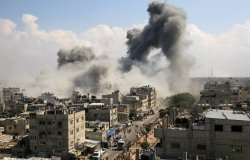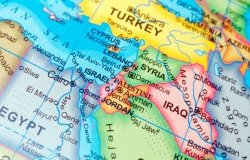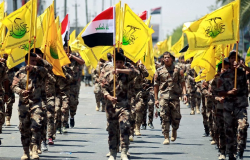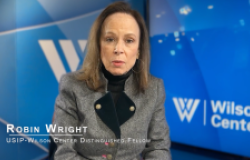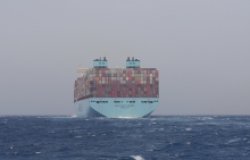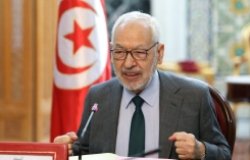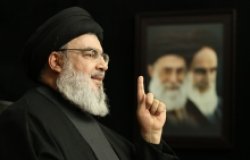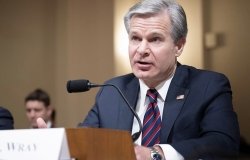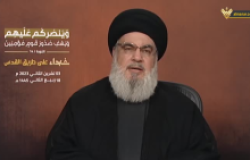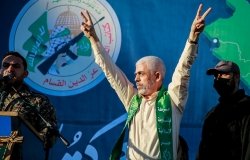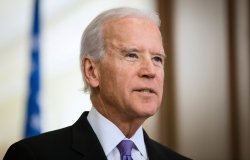Ghannouchi: Middle East at Crossroads
On September 29, Sheikh Rachid al Ghannouchi argued that the Middle East is at a crossroads rather than in a crisis. On one hand, the region is experiencing a rise in extremism and instability, but it is also moving “towards democracy, development and progress,” he said at the United States Institute of Peace.
On September 29, Sheikh Rachid al Ghannouchi argued that the Middle East is at a crossroads rather than in a crisis. On one hand, the region is experiencing a rise in extremism and instability, but it is also moving “towards democracy, development and progress,” he said at the United States Institute of Peace. Ghannouchi appealed for economic and political support to ensure Tunisia remains a successful example of how Islam and democracy can coexist. Ghannouchi heads the Ennahda (Renaissance) Party, the first democratically elected Islamist party to hand over power since the Arab uprisings began in December 2010. He noted that Tunisia is the “last shining candle of the Arab Spring” that other countries in the region could learn from. The following is a translation of his address.
I would like to start by expressing my delight at delivering this lecture at this great intellectual institution, on the situation of the Middle East- which I personally do not see as being in a crisis but rather at a crossroads: between going forward towards democracy, development and progress, and between the relapse of the Arab Spring, the spread of chaos and terrorism, and the return of the regimes of despotism and corruption.
A few years ago, the world was watching with awe the great masses of people flooding squares and roads in Tunis, Tripoli, Cairo and Sanaa, demanding freedom, dignity and the departure of dictatorial repressive regimes, and condemnation of the Syrian regime was a matter of consensus.
The so called 'Arab exception' collapsed before the will of the youth, and it was no longer possible for anyone to describe Arabs and Muslims as unworthy of democracy, or their political culture as rooted in the philosophy of “oriental despotism,” or that support for repressive regimes by the free world is a necessary choice in order to avoid the risk of power falling into Islamists, the “enemies of Western civilization.”
These stereotypes have broken down, and the Arab Spring became a source of inspiration for the people of the world – before facts on the ground changed and forces pulling backwards and working to counter the revolutions succeeded to drown the Syrian revolution in terrorism, disputes and divisions, before matters in Libya deteriorated towards chaos, and before Egypt returned to military rule.
Why did the map of the Middle East change so fast – from a promising democratic movement to hotspots of conflicts and tensions?
Is the cause of that the rise of Islamists to power, and their failure to govern, and to build stable democratic systems?
Ladies and gentlemen, I will, attempt to present a reading that can be taken as an angle or viewpoint towards understanding what is happening in this region which is geographically distant from you, while being closely linked to hottest geostrategic questions which draw your attention and that of your governments.
My reading is based on the reality of Tunisia’s experience, the last shining candle of the Arab Spring. Tunisia has succeeded in acquiring a modernist constitution that stipulates freedom of conscience, guarantees the rights of women and minorities, and is the fruit of joint work between moderate secularists and moderate Islamists. Tunisia has also succeeded to overcome the political crisis it experienced last year, thanks to a national dialogue which culminated in consensus over an independent government tasked with guaranteeing the right conditions for holding elections, which are to be held in the next few weeks. Tunisia is also engaged in a successful war against terrorism, which began under the Troika government led by Ennahdha, which, on 27 August 2013, designated Ansar al Sharia as a terrorist organization, arresting dozens of its leaders, dismantling its cells, and foiling many of its operations, despite the cowardly attacks against our military and security forces.
Why did Tunisia succeed?
The answer, which I believe is evident, is that democracy is possible in the Middle East as long as its conditions are present. There is no “Arab exception.” There is no opposition between Islam and democracy. And dictatorship is not a necessary destiny.
Why did Tunisia succeed then? And why did others fail?
Tunisia succeeded thanks to a variety of factors which, unfortunately, were not present to the required level in other experiences [elsewhere in the Arab world].
The first factor is the rejection of domination and monopoly of power: The Ennahdha Party, which won the majority in the elections of the National Constituent Assembly in 2011, refused to dominate power. We called for a national unity government after the 2011 elections and we were able to form a coalition government with two secular parties – Ettakattol and CPR.
From the beginning, Ennahdha Party has always been committed to the establishment of a political system where secularists and Islamists coexist. That was not always easy, but Ennahdha’s compromises were always the principal catalyst for resolving crises, and for accelerating the adoption of the Constitution.
Coexistence with secularists was the result of a reformist intellectual process, in which our party was the first Islamic movement to adopt democracy in 1981, and announce explicitly that it is a civic party that believes in democracy, citizenship and civic values. It is a conviction which did not change even after the savage wave of repression in the 1990s to which we were subjected to by Ben Ali’s regime. Ennahdha remained a peaceful movement struggling against dictatorship through democratic methods and rejecting violence and extremism.
Refusing domination of power and opting for coexistence between secularists and Islamists were two important factors in the success of the Tunisian model.
The next important factor in Tunisia’s success is the adoption of what we call “consensus” politics. This is based on our belief that during transitional periods ruling a majority of 50% +1 does not lead to a stable political system and that what is needed is as wide a consensus as possible between the main political trends whether in the majority or minority. That is why we wanted a constitution that doesn’t just represent the simple majority, but one that represents the widest majority possible. This principle of consensus has succeeded in saving Tunisia from many of the crises that it faced through a national dialogue that brought together all the political trends represented by 22 parties with no exclusions. The national dialogue succeeded in producing a constitution supported by 94% of the constituent assembly. It also succeeded in creating consensus on the completion of the democratic transition process through the agreement on an independent election commission and on dates for the elections.
Many of these successes were the fruit of the sacrifices made by the majority party to preserve the country’s unity. First, we conceded key ministries, then we conceded the government. It was not an easy decision, but Ennahdha adopted that decision by an overwhelming majority, because it is a responsible party that puts the country’s interest above its own, and realizes that guaranteeing freedom for all Tunisians is more important than clinging to power if that led to division and conflict.
The fourth factor in my opinion is our firm opposition to the political exclusion law, and our refusal to exclude all members of the dissolved former ruling party, despite the dangers of allowing them to operate politically. We saw the effects of exclusion and eradication in several experiences the most recent of which is Libya, and chose instead to leave it to the people to decide, and not to treat those who oppressed, imprisoned and tortured us, and spread corruption and despotism like they treated their opponents for decades.
The fifth factor is related to the nature of the Tunisian military institution which is a republican institution opposed to coups, which stood by the people during the revolution and committed itself to the protection of the democratic transition. This is also true of the security institution which has recovered its effectiveness and soundness.
Thus, ladies and gentlemen, the success of the Tunisian revolution is not a coincidence, but is the fruit of a consensual process led by the Ennahdha Party in collaboration with our partners: political parties, and organisations such as the Workers’ Union and Chamber of Commerce.
The problem is that this success does not negate the existence of serious dangers threatening it, in light of the determination of some to abort all Arab Spring experiments, in order to demonstrate that the Middle East is not eligible for democracy, and that the only appropriate place for Islamists is prison, torture cells, and exile.
You will be told here in the United States that the best option for the region is dictatorship in order to preserve peace. Just as our people are told that they can only enjoy security, prosperity and progress under despotic regimes.
In response we say that this idea is not a new one and that it has been tried in the past. Support for dictatorships in the Middle East in the past has led to disasters in the region and in the world and has led to the emergence and spread of terrorism in the region and throughout the world, and ultimately also led to the revolutions themselves.
We also say that linking Islam and violence will only give extremists greater scope to attract broad sectors of youth, and that young Arabs’ feeling that there is no genuine commitment to supporting democracy can lead them to feelings of disappointment and further bitterness towards themselves, their societies, and towards the other. And we say that the absence of just and comprehensive peace in the Middle East will only feed further tension and hatred.
I return to my first question: Is it a crisis or a crossroads?
The Tunisian model, ladies and gentlemen, demonstrates that it is possible for you to trust the people of the Middle East, and that duty requires all friends of freedom and democracy in the free world to help the region continue its progress towards freedom and modernity.
We appreciate the reference to Tunisia in President Obama’s speech at the U.N. General Assembly where he mentioned Tunisia as a positive example of coexistence between Islamic and secular parties. We also appreciated when he stressed that the war on ISIS is not a war on Islam, and that it cannot lead to a clash of civilisations. I believe it is very important to strongly defend and promote this approach, because confusing Islam and terrorism can only benefit terrorists themselves who oppose democracy and consider it to be un-Islamic, and also benefit dictators who know that the presence of democratic states that guarantee freedom, justice and the rule of law hinder their establishment of regimes based on corruption and repression.
It is important to stress that a uniquely security solution in fighting terrorism is not enough and that relying only on a security solution will complicate this problem even more in the short and long term. As well as security, we need to tackle this problem at the political level through the support of democracy and inclusiveness. We also need to tackle this at the religious, intellectual level by showing that the extreme understanding of Islam that they have is wrong. We should not also forget the socio-economic dimension in the fight against this disease.
In Tunisia we have defeated dictatorship and not we hope that we are on our way to defeating terrorism by showing that there is no contradiction between Islam and democracy, and by building a growing economy. I believe that ‘democratic Islam’ is the antithesis to despotism, preventing it from imposing a choice between security and freedom.
With this vision, Tunisia goes forward towards a new phase in our democratic process, where we will, for the second time since the revolution, seek the people’s will. It is an event which we wish to use an occasion to strengthen the unity of society and build a strong partnership for power.
Ennahdha has willingly made a further concession in order to ensure the success of the coming phase by choosing not to put forward a candidate for the presidential elections, and calling for a national unity government that brings together various parties because we believe that Tunisia cannot be managed by a simple 50% +1 majority in the coming years.
Based on a profound reading of the crises of the region, the causes of which include low development indicators and high youth unemployment, we chose the slogan of Ennahdha’s electoral programme to be “Towards a rising economy and a secure country”.
Out of the realization of the dangers resulting from delayed development solutions, as a result of the fragile economic situation in our country, I appeal to Tunisia’s friends to offer the necessary financial support to the current government and the future government, and not to await investments that require a long time and specific conditions for their execution.
Ladies and gentlemen, I was keen to come to Washington despite being engaged in a busy election campaign, in order to address this enlightened elite, at a critical moment that requires our unity in the defence of freedom and democracy, against the return of dictatorship, to defeat terrorism and to eradicate the causes of his emergence and expansion.
We need an international cooperation based on the defence of freedom and democracy. While the Muslim world needs to make greater efforts in the field of reform and renewal, the building the modern cultural and civilizational systems that counter extremism and rigidity, which is the vision I have defended for four decades or more, that is not possible until we accurately diagnose the causes that brought it to its current state, at the forefront of which are the regimes of despotism, repression and corruption, which have wasted the resources and capabilities of the Arab and Muslim world, imprisoned entire populations in the darkness of repression and denial of freedoms, and destroyed the will of youth pushing them to the feeling of political oppression and development failure and towards networks of extremism.
Thus it is not surprising that takfiris believe that democratic Islam is more dangerous for them than secular regimes. And it is not surprise that terrorists were the principal cause of toppling the two Ennahdha-led Troika governments in Tunisia. And it is not surprising to hear the frequent sermons of leaders of terrorist organisations mocking Islamists who choose the democratic path, to the point of calling for our murder.
Ladies, and gentlemen, from this platform, I call to a comprehensive approach for countering terrorism, where security efforts are complemented by the efforts we are engaged in to resolve conflicts in the Middle East and support the Arab Spring, in the face of the winter of terrorism and dictatorship, and I call for economic support of successful Arab Spring models, and in particular Tunisia, in order for it to maintain its balance.
While I call on the international community to stand by the Syrian people to complete its revolution, I call on young people deluded by terrorist groups to realize the danger of the criminal project of takfiris, and to desist from serving its evil interests.
I also call on Muslim scholars to continue playing their role in exposing the deviations of takfiris, and raising awareness of their dangerous aims that are against peace and against Islam.
The Tunisian experience, which has become a model of complementarity between Islam and democracy, has demonstrated that the solution in the Middle East to guarantee a stable region is supporting freedom and democracy and guaranteeing the right to development and progress
It has also highlighted that democracy is possible in the Middle East, and can be an effective arm against terrorism and the real alternative
This message that I convey to you from Tunisia, whose people have chosen the path of democracy and freedom, through the cooperation between its secular and Islamist elites and its people who sparked the revolutions of the Arab Spring, and who knew how to preserve the flame of their revolution, by God’s grace.
Photo credit: U.S. Institute of Peace
Related Program

The Islamists
Learn more about Hamas and how it relates to similarly aligned organizations throughout the region. Read more
